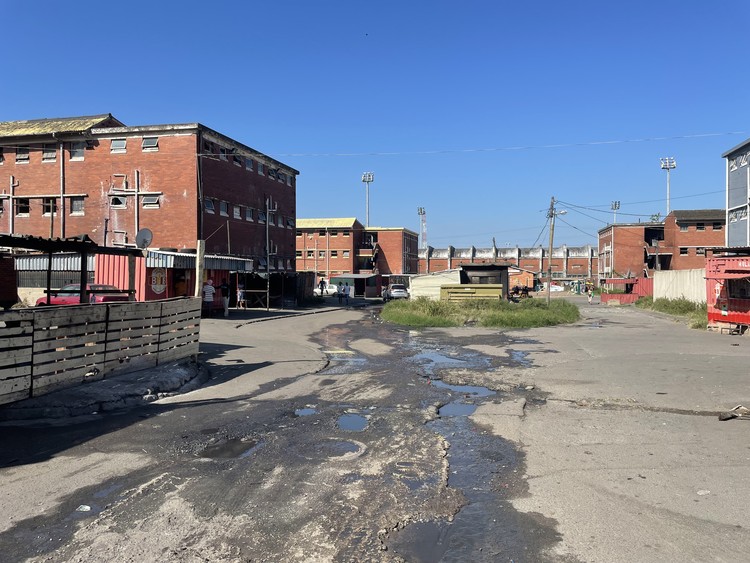
26 May 2025
The potholed road leading to the Wema Hostels. Photos: Joseph Bracken
The rapidly deteriorating Wema Hostels in Lamontville, south of Durban, are home to thousands of people. Residents say they have stopped paying rent to the municipality because there is no maintenance. But the municipality says they cannot provide services if there is no rent.
The hostels consist of 38 municipal-owned buildings that were built during apartheid for black male workers. The hostels were built to house about 4,350 people but they are overcrowded. They have single rooms with communal bathrooms and kitchens. They belong to eThekwini Municipality.
A large crack has formed along the far side of Block G, which houses more than 70 people.
One of the buildings, Block G, which houses more than 70 people according to residents, has a crack that runs all along the far side of the building. Residents say the foundations have started to sink. All the plumbing on the left side of the building is unusable, leaving several communal bathrooms out of order for more than 15 years.
The broken plumbing has become a health hazard, says resident Winifred Mbata. Stagnant sewage still sits in the pipes, creating a foul odour that makes it difficult to stand close to or in the bathrooms for any period.
Residents are now forced to share the small number of communal bathrooms that are still working, none of which have hot water.
Mbata says she has become worried about the well-being of her children. Cracks are also now showing on the interior corridors of the building and uncontrollable mold has begun to grow in the rooms, she says.
Isaac Ntanzi in front of his restaurant. A fire in 2012 left the building without electricity, limiting what Ntanzi can cook.
At the centre of the Wema Hostels there is a building that used to house different trading stores for the residents. But more than ten years ago, a fire destroyed many of the stalls in the building, says Isaac Ntanzi, who runs a restaurant at the front of the building.
Ntanzi says that before the fire, he had employed twelve people and invested almost R200,000 in equipment, including an industrial cold room and cooking equipment. But his dreams were dashed when the fire came. It took out his electricity and he is now only able to cook a small menu of items with his gas cooker.
He says that over the years, teams from the government have been sent to the area to assess the damage, but “no progress” has been made on repairs.
Residents told GroundUp that they have long since stopped paying a monthly rental of R80. They will continue to boycott rent until the municipality comes to fix their issues, they say.
Most of the bathrooms in Block G are no longer working because of broken plumbing due to the crack in the wall.
Gugu Sisilane, the eThekwini municipality spokesperson, explained that the rent boycott has caused a backlog in maintenance.
“Ordinarily, maintenance is supposed to be done utilising the rent revenue that is collected from the hostel residents. However, since the residents are refusing to pay, there is not enough budget available for the planned maintenance.”
Sisilane did not respond to follow-up questions on what the monthly rental amount is, how it is calculated, or how it is supposed to be administered.
This area used to be used for small shops, but was destroyed in the 2012 fire.
There are plans to do renovations in the future, with teams from the municipality having already been sent to do inspections, says Sisilane. “Three blocks are earmarked for demolishing and the construction of new blocks is on the pipeline.” These blocks will also contain new shop spaces. No timeline for this project was provided.
Sisilana acknowledged that the hostels are overcrowded. “According to the Prevention of Illegal Eviction Act (PIE Act), the municipality is not allowed to evict tenants, unless it provides alternative accommodation,” said Sisilane.
There are “competing priorities” when it comes to providing alternative accommodation, including those who reside in informal settlements and flood victims, she says. There is no suitable government-owned land to relocate the hostel residents to.
One of the single rooms, built during apartheid for black migrant workers. Nowadays, up to five people share a room.